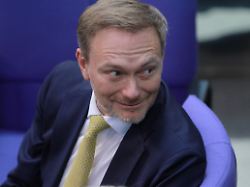“The 2024 rule set will be reviewed”
Lindner advocates a reduction in citizens’ benefits
December 2, 2023, 1:12 a.m
Listen to article
This audio version was artificially generated. More info | Send feedback
Unlike the SPD and the Greens, Finance Minister Lindner does not want to simply wave through the planned increase in citizens’ benefits for 2024. In addition to social issues, he also sees opportunities for savings in international aid and subsidies. But he doesn’t want to reveal which ones will be deleted.
For the first time, Federal Finance Minister Christian Lindner named specific areas of savings in order to close the gaps in the budget for 2024: “We will have to deal with three large cost blocks,” said the FDP politician in an interview with the Funke newspapers. The federal government currently spends 45 percent of its spending on social issues. “We’ll see how we can become more accurate.” For example, the aim here is to get people into work more quickly – and thus reduce social costs for the state. “For the refugees from Ukraine, for example, there is a job boost,” says Lindner.
The minister also announced a review of the regulations on citizens’ money: The inflation rate is currently developing significantly better than was forecast when the standard rate was set for 2024. “When examining the gap between wages and social benefits, we will therefore have to look at the adjustment process. Because there always has to be a noticeable difference whether someone works or doesn’t work,” says Lindner.
“International burden sharing could be fairer”
The FDP politician named international aid as a second area of savings: Germany is at the forefront when it comes to development cooperation and international climate financing. “We can happily stay in first place. But perhaps the gap to second place can be reduced,” said Lindner. The aim could be a “fairer international burden sharing”.
Lindner also sees savings opportunities in government funding programs: “There are numerous subsidies for which the question must be asked whether they actually meet their goals or whether they are out of date.” It is still too early to name individual programs. “Otherwise this will lead to a run on funding programs at the last few meters.” However, there will be no cuts in the defense sector: “The defense budget will remain untouched,” explained Lindner.
“Union does not agree on the debt brake”
Lindner did not want to completely rule out a renewed suspension of the debt brake for 2024: When asked about this, the FDP politician said: “I’m happy to listen to arguments.” However, he is “not yet” convinced that a new suspension can be justified in a constitutionally viable manner. In his opinion, the situation on the energy markets as a result of the Ukraine war no longer constitutes an emergency. Therefore, the electricity and gas price brakes could expire together with the economic stabilization fund on December 31st.
Lindner, however, rejected attempts from the Union to hold early elections: “This is no time for gamblers,” the finance minister continued to tell the Funke newspapers. For those who are flirting with government crises as a result of party tactics, he recommends taking a look at the Netherlands. The right-wing populists became the strongest force there in the parliamentary elections. In the traffic light coalition, everyone has “their own ideas about what is necessary.” However, the three coalition partners share the responsibility to prevent damage to the country and advance its modernization.
When asked whether Lindner would prefer to govern with CDU leader Friedrich Merz, who does not question the debt brake, the minister explained: It is still unclear what the Union’s overall position on the debt brake is. “I have the impression that the self-confident CDU prime ministers are really playing on their party leader’s nose on this issue.”
